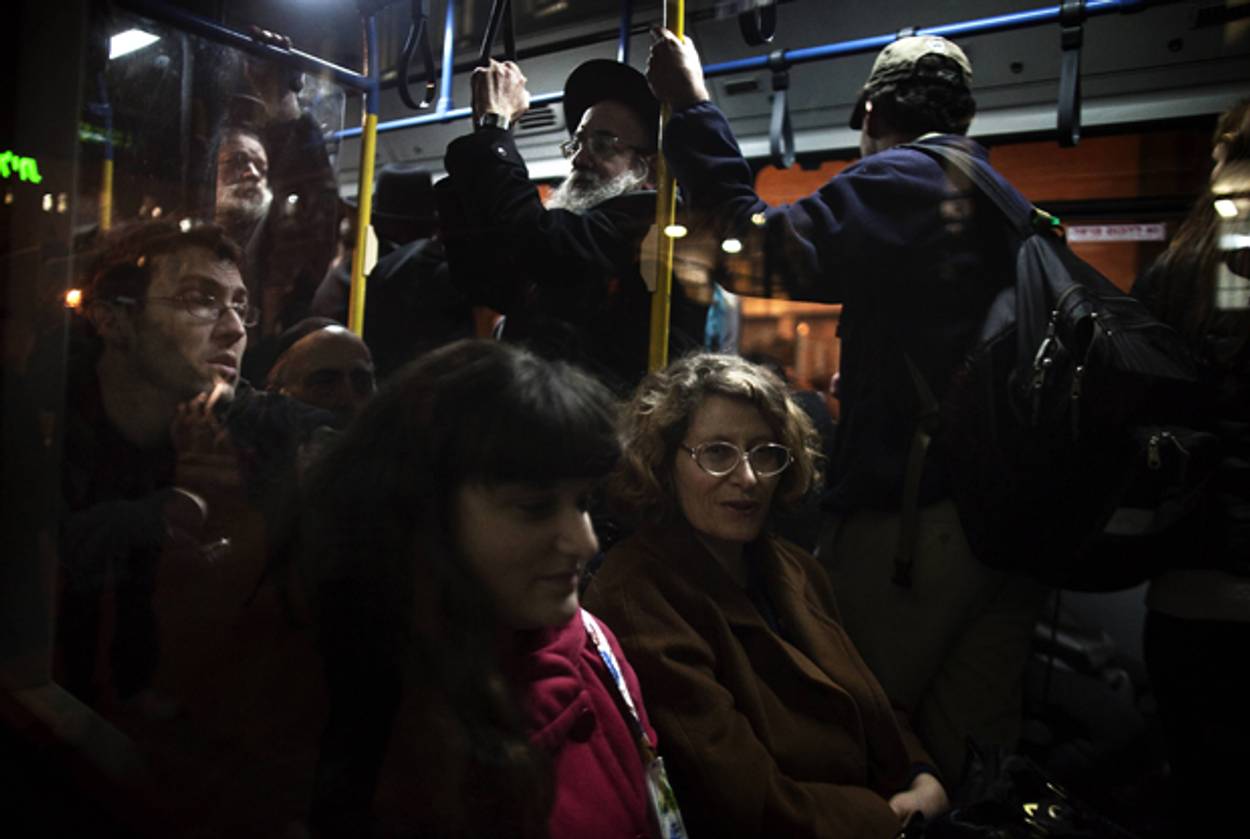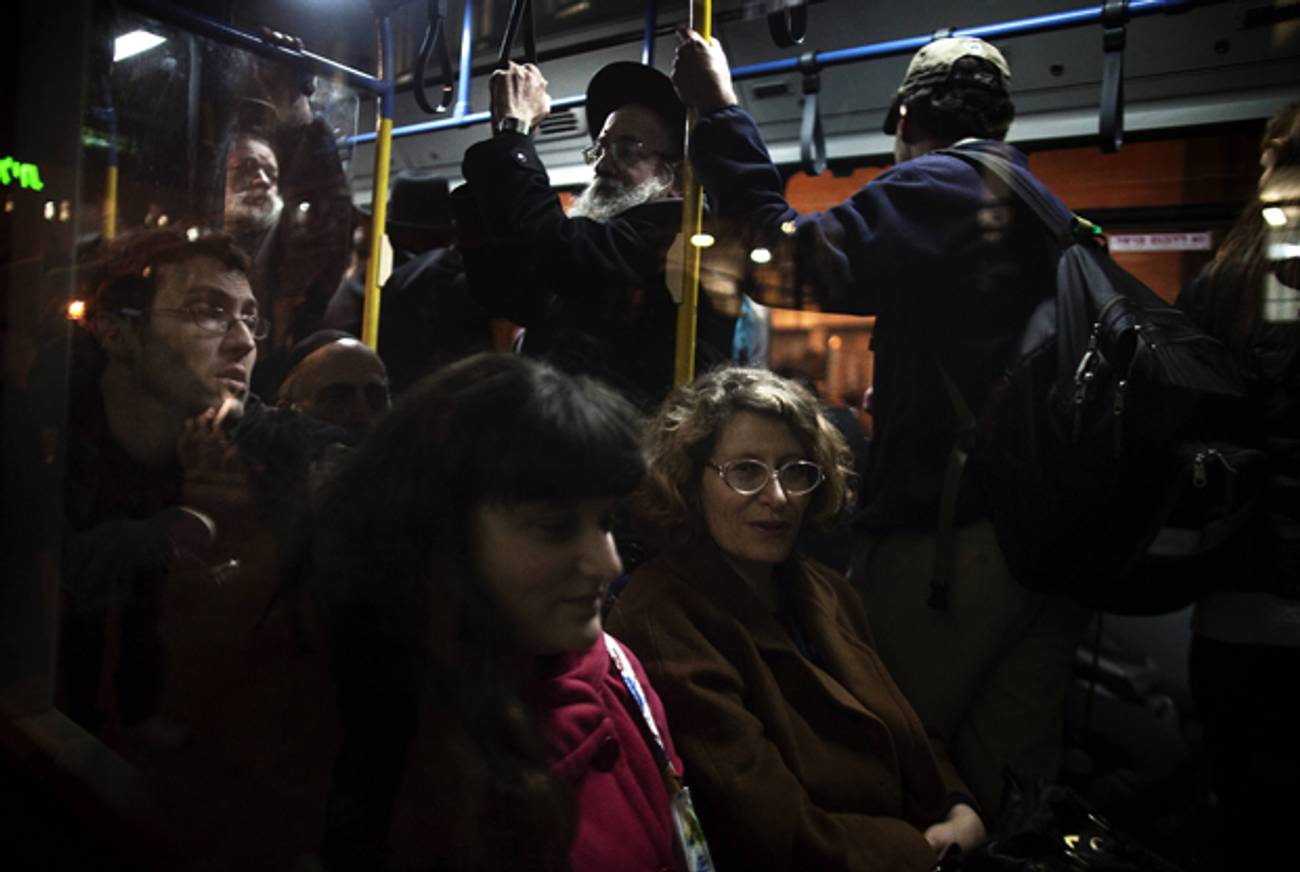Israel’s Freedom Riders
On some Israeli buses, only men sit in the front. With the law on their side, some women are fighting back.




It was morning rush hour in Jerusalem and I boarded a crowded bus, Egged No. 56, and claimed one of the last empty seats in the front. The man in the seat next to mine turned the brim of his black hat against me and nervously tapped his fingers on the window. Two stops later, he got up and the man sitting across from me got up, too.
The bus rattled on. Women boarded the bus—but mostly through the rear door. Pregnant women, elderly women, schoolgirls cradling books, middle-aged women holding packages, fashionably dressed twentysomethings with Gucci pocketbooks, designer sunglasses, stylish wigs. They hurried through the front section toward the back of the bus, deliberately passing the empty seats near me. The men also avoided sitting there. This was once a mehadrin, or sex-segregated, bus line—struck down as illegal by the Israeli Supreme Court on Jan. 5, 2011—but for these riders, sex-segregation is not a thing of the past. Men still ride in the front and women in the back.
Segregated buses made a splash in the Israeli media in December 2011 when Tanya Rosenblit, 28, sat in the front of a public bus going from Ashdod to Jerusalem and refused an ultra-Orthodox man’s demand that she go to the back. The man prevented the bus from moving, enlisting his friends to join his protest. When the bus driver called a police officer, he tried to persuade Rosenblit to comply. She did not back down, and eventually the bus took off without the male passenger. “I cannot humiliate myself in order to respect someone else,” Rosenblit wrote. Prime Minister Benjamin Netanyahu, President Shimon Peres, and other politicians roundly condemned bus segregation.
But, though there are no more de jure segregated bus lines, many former mehadrin bus lines resolutely maintain de facto segregation. I’d volunteered to take this bus as a Freedom Rider, a volunteer group of men and women who, under the auspices of the Jerusalem-based Israel Religious Action Center, monitor the everyday implementation of bus desegregation. Since the Supreme Court ruling, hundreds of Freedom Riders have traveled on buses to demonstrate to the public that women are legally entitled to sit wherever they want. And as I rode this bus—and several others for an entire morning this month—I thought about how the segregation of women on public buses symbolizes something far greater than just a seating arrangement. It is part of the agenda set by a very small minority of extremists within Israel’s ultra-Orthodox community (which is itself a minority) to push women not only to the back of the bus—but to the back of Israeli public space. The country I love and have lived in for the past 21 years is threatened by extremists who believe that a woman’s modesty is defined by her invisibility.
“Buses are democracy at its finest—you pay your fare, you take your seat,” said Steven Beck, the IRAC director of Israel-Diaspora Relations, who was riding the bus with me, along with two other women visiting from America. Beck stood in the middle of the bus to watch passengers’ reactions; in response to a Haredi man who said that our presence in the front of the bus was a provocation, Beck said, “We’re not trying to change Haredi society; we just want to make sure that public services are accessible to everyone.”
The Egged Bus Company, the largest in Israel, began its segregated mehadrin bus lines in 1998 to lure passengers away from another bus company. After several law suits were filed by women who were harassed and beaten for refusing to go to the back of a mehadrin bus (including writer Naomi Ragen), the Israeli Supreme Court outlawed these buses. Orly Erez Likhovski, an IRAC lawyer specializing in sex discrimination cases, told me that now, “If someone tells you that the bus is mehadrin and you have to move because of your sex then it is ground for civil damages.’’
As part of the Supreme Court decision, Likhovski said, the Egged Company is required to place stickers on buses stating, “All passengers are permitted to sit wherever they choose … harassing a passenger about this matter could be considered a criminal offense.” Still, the stickers (which are sometimes removed) and the Supreme Court ruling have done little to change the facts on the ground.
They have, however, bolstered women who refuse to budge. After my first bus ride of the morning, I decided, somewhat nervously, to continue riding former mehadrin buses—alone. I waited for another bus in the heart of downtown Jerusalem and got on. When I asked the driver where I should sit, he said “in the back.” But after telling him I wanted to sit in the front, he told me to do whatever I want, just to know that “people who ride this bus want it to be half-half: men in the front and women in the back. And I don’t want to deal with any problems. I just want to focus on driving the bus.”
The Supreme Court ruling demands that drivers take proactive action to defend a woman’s decision to sit where she wants. The driver is held personally liable, which is probably why this driver would have preferred I sat in the back. Likhovski said that since the Rosenblit case, more women have come forward to sue bus drivers; she recently won a case in which a judge awarded a woman 4,000 shekels against a driver who told her to move to the back.
I took my seat in front. The next woman who boarded the bus said to me, “This is a mehadrin bus. You should go to the back.”
“There’s really no such thing as mehadrin buses anymore,” I told her. “And did you know that in the United States, American blacks used to have to sit in the back of buses?”
“That was for discrimination,” she said. “This is for modesty. It gives men more respect.”
Neta Ravid, a neuroscience doctoral student at Hebrew University who helped found the Freedom Riders Campaign after men yelled at her to go to the back of a bus traveling from Arad to Jerusalem, disagreed. “It’s not a question of modesty but of equality,” Ravid said. “Pushing women to the back leads to the idea that women should be hidden. This will have dangerous results for Israeli society.”
On my second bus loop around the city, the next bus driver told me that he’s seen husbands and wives talk to each other on cellphones from separate sections of the same bus. He told me I could sit anywhere moments before a group of Haredi teenagers boarded. “Go to the back of the bus!” One of them said to me and then added, “Ichsa,” which means disgusting.
“All passengers can sit wherever they want,” the bus driver said loudly.
I said nothing but refused to move from my seat in the front. A short while later, an older woman with two shopping bags got on.
“Go to the back,” the boys repeated.
“You can go sit in the back,” the woman said, her voice shaky. “If it’s your private car, you can tell me what to do, but this bus is for everyone.” The woman plopped herself down next to me. “I keep kosher at home, I follow the laws,” she said, telling me only her first name, Rivka, and her age, 64. “I should listen to them? They should tell me what to do?”
At the time of its ruling, the Supreme Court granted the Ministry of Transportation a one-year trial period in which women would be allowed to board former mehadrin buses through the rear door—something they are not allowed to do on regular lines. Some Haredi leaders have put up announcements urging women to insist on boarding all buses through the rear door—contradicting the court ruling—and reminding them to “obtain a monthly pass in order to board through the second door without having to pass among the men.” In fact, I’d seen several women send their sons or daughters up to the front to pay the bus fare. Likhovski, the attorney, said that the Ministry of Transportation is expected to issue its decision on whether to completely ban rear-door boarding in a matter of days.
Voluntary sex-segregation also means that husbands and wives do not—cannot—sit together. Reached by telephone, a Hasidic Orthodox woman I know, who requested anonymity for fear of communal repercussions against her children, said that when she and her husband have traveled together on buses, other passengers have screamed at them to separate. “They yelled and even spit at me, but we stayed right where we were,” she said.
“They don’t want us to do what we want,” she added. “If I’m pregnant and I don’t feel well or I want to sit with my husband wherever there’s an empty seat, then I’ll sit. I don’t care.”
“So, do you want to ride the buses again with me?” I asked.
“I have six little kids, thank God,” she said. “Maybe in a few years. Who has time to ride the buses now?”
***
Like this article? Sign up for our Daily Digest to get Tablet Magazine’s new content in your inbox each morning.
Diana Bletter is a writer based in the Western Galilee and author of the forthcoming memoir, The Mom Who Took Off On Her Motorcycle. She blogs at The Best Chapter.
Diana Bletter is a writer based in the Western Galilee and author of the forthcoming memoir, The Mom Who Took Off On Her Motorcycle. She blogs at The Best Chapter.